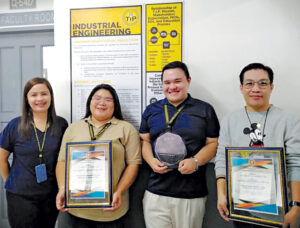Two teams of future engineers from the Technological Institute of the Philippines (TIP) Quezon City and Manila were recognized for their innovative projects at the recent 2023 Annual Research Awards (ARAW) hosted by the Polytechnic University of the Philippines (PUP).
Six incoming TIP Quezon City industrial engineering (IE) seniors led by Allen Serrano and Francine Daphne Carigma earned the Outstanding Research of the Year award for their ‘HeatFlask’ project, which also won the Best Commercialization Research category.
‘HeatFlask’ is a self-heating container for people who are looking for a safe and convenient way to warm up canned food and drinks in the absence of a stove or microwave oven. It is made of stainless steel with a heat pack inside to facilitate the reheating process.
Mr. Serrano said the product was a result of their project feasibility study under adviser Engr. Jaypy Tenerife.
Ms. Carigma, who is into the food packaging business, pitched the idea after she saw a Filipino startup adopt a similar approach using boxes.
“We just thought of other alternative methods to heat up food products and that is how we came up with ‘HeatFlask,’” said Ms. Carigma.
The team left many rooms for improvement in terms of product design as it is currently limited to reheating canned goods.
Nevertheless, Engr. Tenerife is proud that the ARAW panelists saw merit in the project of his students. He credited it to his team’s “level of commitment” in developing a good business model that emphasized the unique selling proposition of their prototype.
“It (HeatFlask) really showed a lot of promise as a business concept. I think that became our edge compared to the rest of the entries,” Mr. Tenerife said.
Other IE students involved in the project were Cyrdio Adrian Dela Peña, Irah Scott Naldoza, Jemuel Tan and Neriel John Villamor.
The 2023 ARAW awards welcomed 97 submissions from different schools nationwide with the theme “Resiliency and Sustainability in Times of Post-Pandemic: The Commitment of Serving the Country through Engineering, Science, and Technology.”
A group of graduating TIP Manila civil engineering students were also named first runner-up in the Best Scientific Research category of the competition for presenting a viable strategy to protect the structural integrity of buildings.
Batchmates Honey Lyn Gutierrez, Annedrei Figueroa, Jamniel Danish Gonzales, and Russel Veraña submitted their research titled “Enhancing the Seismic Resilience of 42-Story Reinforced Concrete Structure with Fluid Viscous Damper System Using Modal Decomposition Method.”
The study focused on developing a cost-effective approach to install energy dissipating devices in high-rise buildings. This also served as their capstone project under faculty member and adviser Engr. Dustin Glenn Cuevas.
Fluid viscous dampers work by absorbing vibrations or seismic waves from earthquakes to mitigate, if not eliminate, cracks and fissures that may otherwise result in significant property damage. This system is quite expensive depending on the scale of the construction project.
“In structural engineering, we refer to it as the ‘optimal damper placement’ problem, which many structural engineers are still trying to solve today,” said Mr. Cuevas. There are several ways to address this, but the team adopted the modal decomposition method because “it is more efficient and you get the same performance.”
The 14th ARAW awards was held onsite last July 25 at the PUP campus in Santa Mesa, Manila. It was organized in collaboration with the Department of Science and Technology-Technology Application and Promotion Institute.
